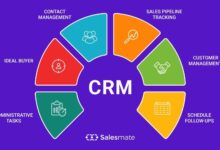CRM with AI Chatbot Integration: Enhanced Customer Engagement
CRM with AI Chatbot Integration represents a significant advancement in customer relationship management. This powerful combination leverages the efficiency of CRM systems with the personalized interaction capabilities of AI chatbots, creating a synergistic approach to customer engagement and operational optimization. The integration seamlessly blends automated responses with human intervention, leading to improved customer satisfaction, increased efficiency, and ultimately, a stronger bottom line.
By automating routine tasks, AI chatbots free up human agents to focus on more complex issues, leading to faster response times and a more personalized customer experience. This improved efficiency translates to cost savings and enhanced productivity. Furthermore, the ability to gather and analyze customer data in real-time allows businesses to gain valuable insights into customer preferences and behavior, enabling data-driven decision-making for targeted marketing and product development.
Defining CRM with AI Chatbot Integration
A Customer Relationship Management (CRM) system, integrated with an AI-powered chatbot, represents a significant advancement in customer interaction and business efficiency. This powerful combination leverages the organizational capabilities of a CRM with the personalized responsiveness and scalability of AI.
Core Functionalities of a CRM System
CRM systems fundamentally aim to manage and analyze customer interactions and data throughout the customer lifecycle. This involves several key functionalities, including contact management (organizing customer information), sales management (tracking leads and sales processes), marketing automation (automating marketing tasks and campaigns), customer service management (managing support tickets and inquiries), and reporting and analytics (providing insights into customer behavior and performance). These features work together to provide a holistic view of the customer, enabling businesses to personalize interactions and improve overall customer experience.
AI Chatbot Enhancements to CRM Capabilities
AI chatbots significantly enhance CRM capabilities by automating repetitive tasks, personalizing customer interactions, and providing real-time support. They can handle a high volume of inquiries simultaneously, freeing up human agents to focus on more complex issues. AI chatbots also learn from past interactions, improving their ability to understand and respond to customer needs over time. This learning capability allows for increasingly accurate and efficient responses, leading to improved customer satisfaction and reduced operational costs. Furthermore, AI chatbots can integrate seamlessly with other CRM functionalities, such as lead generation and sales automation, streamlining the entire customer journey.
Examples of AI Chatbot Improvement in Customer Interactions
Consider a scenario where a customer has a billing question. A traditional CRM might require the customer to navigate a phone menu or submit an email, potentially leading to long wait times and frustration. With an AI-integrated CRM, the chatbot can instantly answer common billing questions, provide account details, or even initiate a refund process, all within a single, conversational interface. Another example is proactive customer support. An AI chatbot, analyzing customer data, can identify potential issues before they escalate, such as a customer about to churn. The chatbot can then proactively reach out, offering personalized assistance or incentives to retain their business. Finally, AI chatbots can personalize marketing messages based on individual customer preferences and past interactions, leading to higher engagement rates and improved conversion rates.
Comparison of Traditional CRM and AI-Integrated CRM
| Features | Traditional CRM | AI-Integrated CRM |
|---|---|---|
| Customer Interaction | Primarily human-driven, potentially slow response times | Automated interactions via chatbot, 24/7 availability, faster response times |
| Cost | Lower initial investment, but higher operational costs due to manual processes | Higher initial investment, but lower long-term operational costs due to automation |
| Efficiency | Lower efficiency due to manual tasks and potential human error | Higher efficiency due to automation and improved data analysis |
| Customer Satisfaction | Can be variable, depending on human agent availability and performance | Generally higher due to faster response times, personalized interactions, and 24/7 availability |
Benefits of AI Chatbot Integration in CRM
Integrating AI-powered chatbots into your Customer Relationship Management (CRM) system offers a multitude of advantages, streamlining operations, enhancing customer experiences, and ultimately boosting your bottom line. This integration leverages the power of artificial intelligence to automate tasks, personalize interactions, and provide valuable data-driven insights, leading to significant improvements across various aspects of your business.
AI chatbots significantly enhance several key business processes. By automating routine tasks and providing 24/7 availability, they free up human agents to focus on more complex issues, leading to increased efficiency and improved overall productivity. This translates directly into cost savings and a more effective use of human resources.
Improved Lead Generation and Qualification
AI chatbots can proactively engage website visitors, gathering information through interactive conversations. This allows for immediate lead capture and initial qualification based on pre-defined criteria. For example, a chatbot could ask qualifying questions such as budget, timeline, and project scope, filtering out unqualified leads and prioritizing those most likely to convert. This automated lead nurturing significantly improves sales team efficiency by focusing their efforts on high-potential prospects. The data collected through these interactions provides valuable insights into lead behavior and preferences, further refining targeting strategies.
Enhanced Customer Service Efficiency and Satisfaction
AI chatbots provide instant support, answering frequently asked questions and resolving simple issues around the clock. This immediate response time drastically reduces customer wait times, improving satisfaction and fostering loyalty. Furthermore, chatbots can handle multiple conversations simultaneously, unlike human agents, resulting in significantly increased service capacity. By providing consistent and accurate information, chatbots also minimize errors and inconsistencies in customer service, leading to a more positive overall customer experience. Personalized recommendations and proactive support, based on customer data within the CRM, further enhance the customer journey.
Case Study: Increased ROI for a Retail Company
Let’s consider a hypothetical case study of a mid-sized online retailer. Before AI chatbot integration, their customer service team faced long wait times, resulting in customer frustration and lost sales. They implemented an AI chatbot integrated with their CRM, automating responses to common queries about shipping, returns, and order tracking. The results were impressive. Within three months, the chatbot handled 60% of customer inquiries, freeing up human agents to focus on complex problems. Customer satisfaction scores increased by 15%, as measured by post-interaction surveys, and the company saw a 10% reduction in customer service costs. Moreover, the data collected by the chatbot provided valuable insights into common customer issues, enabling the company to proactively address these concerns and improve their product offerings. This resulted in a 5% increase in sales conversion rates. The overall ROI on the AI chatbot integration was calculated to be 25% within the first year. This demonstrates the significant return on investment possible through effective AI chatbot implementation in a CRM system.
Implementation and Integration Strategies
Integrating an AI chatbot into your CRM, whether it’s a new or existing system, requires careful planning and execution. Success hinges on a well-defined strategy that considers both technical aspects and the overall business objectives. A phased approach, focusing on clear goals and measurable outcomes, is crucial for a smooth and effective integration.
Implementing an AI chatbot within a CRM system involves a series of interconnected steps that require coordination between technical and business teams. The process necessitates a thorough understanding of the existing CRM infrastructure, the capabilities of the chosen AI chatbot platform, and the specific needs of the business. A clear project roadmap, with defined timelines and responsibilities, is essential for managing the complexity of the integration.
Key Steps in Integrating an AI Chatbot into an Existing CRM
Integrating an AI chatbot into an existing CRM system involves a phased approach. First, assess your current CRM’s capabilities and identify any limitations that might affect integration. Then, select a compatible AI chatbot platform and define the chatbot’s functionality and desired user experience. The next step is the actual integration, followed by rigorous testing and refinement to ensure optimal performance and accuracy. Finally, ongoing monitoring and optimization are crucial for maximizing the chatbot’s effectiveness.
Step-by-Step Guide for Implementing a New CRM with AI Chatbot Functionality
Implementing a new CRM system with integrated AI chatbot functionality requires a more comprehensive approach. Begin by defining your business requirements and selecting a CRM platform that supports AI chatbot integration. Next, choose an AI chatbot platform that seamlessly integrates with the selected CRM. Develop the chatbot’s conversational flows and knowledge base, ensuring alignment with your business goals. Following this, deploy the integrated system and conduct thorough testing to identify and resolve any issues. Finally, train your team on using the new system and continuously monitor and improve its performance.
Technical Considerations for Seamless Integration
Seamless integration depends on several crucial technical aspects. Data security and privacy must be prioritized throughout the process. Ensuring the chatbot can access and process CRM data securely and efficiently is paramount. Scalability is also key; the system must be able to handle increasing volumes of data and user interactions without performance degradation. Finally, robust error handling and logging mechanisms are essential for troubleshooting and maintaining system stability. A well-defined API integration strategy is vital to avoid data silos and ensure a unified user experience.
Integration Methods
Choosing the right integration method is vital for a successful implementation. The options available offer varying levels of complexity and control.
- API Integration: This method offers maximum flexibility and control, allowing for customized integration with specific CRM functionalities. It requires more technical expertise but provides the most tailored solution. For example, a company might use an API to integrate a chatbot with their Salesforce CRM, allowing the chatbot to access and update customer data directly within the CRM.
- Pre-built Integrations: Many CRM platforms and AI chatbot providers offer pre-built integrations that simplify the process. These integrations typically involve configuring pre-existing connectors, requiring less technical expertise but potentially offering less customization. An example is a pre-built integration between Zendesk and a popular chatbot platform, enabling automated customer support ticket handling.
- Hybrid Approach: A combination of API integration and pre-built integrations can be used to balance flexibility and ease of implementation. This approach allows for customization in critical areas while leveraging pre-built connectors for less complex functionalities. For instance, a company might use a pre-built integration for basic chat functionality but leverage an API to integrate with specific internal systems for advanced data retrieval.
AI Chatbot Features and Capabilities within CRM
Integrating AI chatbots into your CRM system significantly enhances customer interactions and streamlines internal processes. These intelligent assistants offer a range of capabilities that go beyond simple automated responses, providing personalized experiences and valuable insights. The choice of chatbot type and the features implemented directly impact the overall effectiveness of the integration.
Types of AI Chatbots for CRM Integration
Several types of AI chatbots are suitable for CRM integration, each with its own strengths and weaknesses. The optimal choice depends on the complexity of your needs and available resources. Rule-based chatbots offer a straightforward approach, while machine learning-based chatbots provide more sophisticated and adaptable capabilities.
Features of AI Chatbots Enhancing CRM Functionality
AI chatbots integrated into CRM systems leverage advanced features to improve customer experience and operational efficiency. These features include natural language processing (NLP) for understanding human language, sentiment analysis for gauging customer emotions, and personalized responses tailored to individual customer profiles. These capabilities allow for more efficient handling of customer queries and proactive engagement.
Impact of AI Chatbot Features on Customer Experience and Operational Efficiency
The implementation of features like NLP, sentiment analysis, and personalized responses directly translates to a better customer experience and improved operational efficiency. NLP enables chatbots to understand and respond to a wide range of customer queries accurately. Sentiment analysis helps identify frustrated customers, allowing for timely intervention and issue resolution. Personalized responses build rapport and foster customer loyalty. Operationally, chatbots handle routine tasks, freeing up human agents to focus on complex issues, leading to increased productivity and cost savings. For example, a company using an AI chatbot to handle basic order tracking queries might see a reduction in call center volume by 20%, freeing agents to handle more complex customer issues.
Comparison of AI Chatbot Features and Benefits within CRM
| Feature | Description | Benefits | Example |
|---|---|---|---|
| Natural Language Processing (NLP) | Enables the chatbot to understand and respond to human language in a natural and conversational way. | Improved customer satisfaction, reduced response times, increased accuracy of query resolution. | A customer asks, “My order is late,” and the chatbot understands the intent and provides tracking information. |
| Sentiment Analysis | Analyzes customer text and voice to determine the emotional tone (positive, negative, neutral). | Proactive issue resolution, improved customer service, identification of potential problems. | The chatbot detects frustration in a customer’s message and escalates it to a human agent. |
| Personalized Responses | Tailors responses based on customer data (history, preferences, etc.) stored in the CRM. | Increased customer engagement, improved brand loyalty, more effective marketing. | The chatbot greets returning customers by name and offers personalized product recommendations. |
| 24/7 Availability | Provides instant support around the clock, improving customer accessibility. | Enhanced customer satisfaction, increased sales opportunities, reduced wait times. | Customers can receive immediate assistance with order inquiries or technical issues at any time. |
Challenges and Considerations
Integrating AI chatbots into a CRM system offers significant advantages, but it’s crucial to acknowledge and proactively address potential challenges to ensure a successful implementation. Failure to do so can lead to frustration, wasted resources, and ultimately, a system that fails to meet its intended goals. Careful planning and a realistic understanding of the complexities involved are essential for a smooth transition.
Implementing AI chatbots within a CRM presents several hurdles that require careful consideration. These challenges span technical aspects, data management, and the overall user experience. Addressing these issues upfront can prevent costly mistakes and ensure the AI chatbot effectively enhances, rather than hinders, the CRM’s functionality.
Data Security and Privacy
Data security and user privacy are paramount concerns when integrating AI chatbots into a CRM. The chatbot will inevitably handle sensitive customer data, including personal information, purchase history, and communication records. Breaches can lead to significant financial losses, reputational damage, and legal repercussions. Robust security measures, including data encryption, access controls, and regular security audits, are vital to protect this information. Compliance with relevant data privacy regulations, such as GDPR and CCPA, is also non-negotiable. Companies should invest in security technologies and implement strict protocols to ensure the confidentiality, integrity, and availability of customer data. Failure to do so can result in severe penalties and erode customer trust.
Addressing Limitations and Potential Drawbacks
AI chatbots, while powerful, are not without limitations. They may struggle with complex or nuanced queries, leading to inaccurate or unsatisfactory responses. Furthermore, the chatbot’s ability to understand and respond appropriately is heavily dependent on the quality and quantity of training data. Insufficient training data can result in a chatbot that is unable to handle a wide range of customer interactions effectively. Strategies for addressing these limitations include: (1) providing comprehensive training data, (2) incorporating human-in-the-loop systems to handle complex queries, and (3) continuously monitoring and improving the chatbot’s performance based on user feedback and interaction data. Regular updates and improvements to the chatbot’s algorithms and knowledge base are also crucial to address evolving customer needs and technological advancements.
Ongoing Monitoring and Improvement
The performance of an AI chatbot is not static; it requires ongoing monitoring and refinement. Regularly analyzing chatbot interactions, identifying areas for improvement, and updating its knowledge base are essential for maintaining optimal performance. Key performance indicators (KPIs) such as customer satisfaction scores, resolution rates, and average handling time should be tracked and analyzed to identify areas needing attention. This continuous improvement process ensures the chatbot remains effective, accurate, and aligned with the evolving needs of the business and its customers. Furthermore, incorporating user feedback mechanisms allows for proactive identification and resolution of issues, ensuring the chatbot remains a valuable asset to the CRM system.
Future Trends and Developments
The integration of AI chatbots within CRM systems is rapidly evolving, driven by advancements in machine learning and natural language processing. We’re moving beyond simple rule-based chatbots to sophisticated systems capable of understanding nuanced customer interactions and providing highly personalized experiences. This section explores the key trends shaping the future of AI-powered CRM.
The convergence of AI and CRM is poised to revolutionize customer relationship management, leading to more efficient operations, improved customer satisfaction, and increased revenue generation. This will be achieved through increasingly sophisticated AI capabilities and the seamless integration of these capabilities within existing CRM platforms.
AI-Driven Predictive Analytics in CRM
AI is transforming predictive analytics within CRM, enabling businesses to anticipate customer needs and proactively address potential issues. Machine learning algorithms analyze vast amounts of customer data – purchase history, website activity, social media interactions – to identify patterns and predict future behavior. For example, a clothing retailer might predict which customers are likely to churn based on their recent browsing history and purchase frequency, allowing the company to offer targeted retention offers. This proactive approach leads to improved customer loyalty and reduced churn rates.
Hyper-Personalization Through AI Chatbots
Future CRM systems will leverage AI to deliver truly hyper-personalized customer experiences. AI-powered chatbots will be able to access and analyze a customer’s entire interaction history with the company, allowing them to tailor their responses and offers to individual needs and preferences. Imagine a chatbot that remembers a customer’s previous purchase and suggests complementary products, or one that anticipates a customer’s questions based on their past interactions. This level of personalization fosters stronger customer relationships and drives sales.
Enhanced Natural Language Processing (NLP) Capabilities
Advancements in NLP are crucial for improving the effectiveness of AI chatbots in CRM. Future chatbots will understand and respond to more complex and nuanced language, including slang, idioms, and emotions. This will allow for more natural and human-like conversations, enhancing customer satisfaction and reducing frustration. For instance, a chatbot might detect sarcasm or frustration in a customer’s message and adjust its response accordingly, leading to a more positive interaction. The integration of sentiment analysis will further enhance the chatbot’s ability to understand the emotional context of customer interactions.
Integration with Other AI Technologies
The future of AI in CRM involves seamless integration with other AI technologies, such as computer vision and voice recognition. This will allow for more immersive and engaging customer interactions. For example, a customer might use a voice-activated chatbot to inquire about a product, and the chatbot could then use computer vision to identify the product in an image the customer provides. This multi-modal approach to customer interaction will create a more seamless and efficient experience.
The Rise of Conversational AI and Omnichannel Support
Conversational AI is becoming increasingly sophisticated, enabling chatbots to handle more complex tasks and provide more comprehensive support. Future CRM systems will integrate chatbots across multiple channels, including websites, social media, messaging apps, and email, providing a consistent and seamless customer experience regardless of the channel used. This omnichannel approach ensures that customers can interact with the business through their preferred channels, leading to improved customer satisfaction and loyalty. For instance, a customer could start a conversation with a chatbot on a company’s website and continue the conversation later through a messaging app, without any disruption to the flow of communication.
Conclusive Thoughts
In conclusion, the integration of AI chatbots into CRM systems offers a compelling solution for businesses seeking to enhance customer engagement, streamline operations, and improve profitability. By automating tasks, personalizing interactions, and providing valuable data-driven insights, AI-powered CRM solutions are transforming the way businesses interact with their customers. The ongoing advancements in AI technology promise even more innovative applications in the future, further solidifying the importance of this integration for businesses of all sizes.




